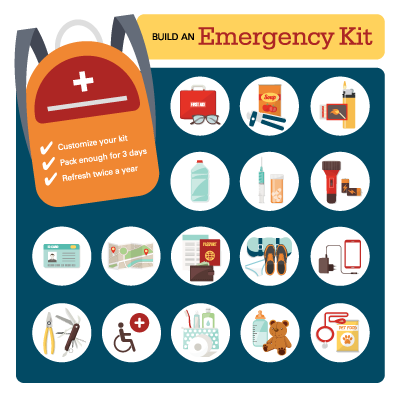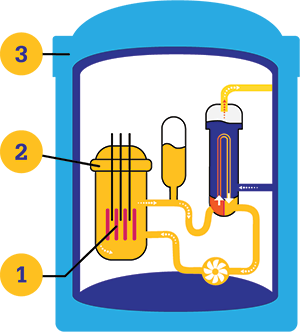How can we help you?


It is important to know which types of disasters could affect your area. Your Emergency Plan will contain emergency contacts, medical information, your protective action zone, evacuation and sheltering information, and more.
Your Emergency Kit should have supplies to last at least three days for each family member. Keep it in an easy-to-carry bag, such as a backpack, duffel bag, or suitcase.
Kit items include:
Persons with access and functional needs who may need evacuation assistance—Make a Plan. Contact your locality to learn about options and how to sign-up for services. Locality contact information is provided under More Information below.

Not all shelters and hotels accept pets. Plan ahead to stay with family, friends, or at pet-friendly locations if you need to evacuate your home. If a hotel has a no-pets policy, ask the hotel can waive the policy during the emergency. Don’t hesitate to leave your home in an emergency because you don’t want to leave your pet(s) behind.
Kit items include:
The following are pet-friendly hotel resources: bringfido.com, dogfriendly.com, petswelcome.com, and tripswithpets.com.

Local radio and TV stations will have information and provide actions to take to keep you safe in the unlikely emergency event at V.C. Summer. The public will be alerted and notified of an emergency via the Integrated Public Alert and Warning System (IPAWS). IPAWS is FEMA’s national system for local alerting that provides authenticated emergency and life-saving information to the public.
In an emergency, an emergency alert will be sent to your emergency alert-enabled mobile device at no charge to you. When you receive an emergency alert on your phone, tune in to one of your local radio or TV station for emergency information and instructions.
Receiving an emergency alert on your phone, does NOT mean you should evacuate. It means turn on your local radio or television station(s) and listen for information and instructions on what to do. A list of local television and radio stations is provided below.
In order to receive an alert on your phone, you must have a mobile device and be located in the affected area where the alert is being sent. To ensure you receive the alert, go to your mobile phone’s settings, under notifications, scroll to the bottom and confirm all Emergency Alerts are turned on.
In an emergency, parents of school children need to listen to local radio and/or radio station(s) for updates on school status and instructions. Emergency officials will advise schools on what actions to take. If told to evacuate, the schools will go to the to their assigned Reception Center. List of schools and assigned Reception Centers provided below.
| Radio Stations | TV Stations |
|---|---|
| WCOS 1140 AM WCOS 97.5 FM WTCB 106.7 FM WLTR 91.3 FM |
WIS Ch. 10 WLTX Ch. 19 WOLO-TV Ch. 25 WACH Ch. 57 |
The 10-mile area around V.C. Summer Nuclear Station is divided up into 13 zones, called Protective Action Zones (PAZ). Knowing your PAZ will let you know if your zone is affected by the emergency and what actions to take to keep you safe.
Listen carefully to instructions specific to your zone. Not all PAZs may be affected by the emergency or need to evacuate.
If your PAZ is instructed to evacuate, listen for instructions to report to your assigned Reception Center. Reception Centers offer contamination monitoring, decontamination if necessary, and other care services.
If you live or work within the 10-mile area of V.C. Summer Nuclear Station, access the SCEMD’s Nuclear Facility Zones interactive map and find your PAZ or view in the SC Emergency Manager mobile app. You may also view the static map.
Below is a list of Reception Centers. Unless told otherwise, use the primary evacuation route below to get to your assigned Reception Center.
| County | Sector | Primary Evacuation Route | Reception Center |
|---|---|---|---|
| Fairfield | A-0 | 213 East, 321 North, to | Fairfield Magnet School for Math and Science |
| Fairfield | A-1 | 257 North, to 99 North, to 34 East, 321 North, to | Fairfield Magnet School for Math and Science |
| Fairfield | A-2 | 34 East, 321 North, to | Fairfield Magnet School for Math and Science |
| Fairfield | B-1 | 213 East, 321 North, to | Fairfield Magnet School for Math and Science |
| Fairfield | B-2 | 213 East, 321 North, to | Fairfield Magnet School for Math and Science |
| Fairfield | C-1 | 215 South, 269 North, 321 North, to | Fairfield Magnet School for Math and Science |
| Fairfield | C-2 | 215 South, 269 North, 321 North, to | Fairfield Magnet School for Math and Science |
| Richland | D-1 | 26 East, 20 East, 277 North, 77 North,
Exit 27 Blythewood Rd, to State Rd S-40-59 Muller Rd |
Muller Road Middle School* |
| Lexington | D-2 | 26 East, Exit 103 Harbison Blvd to St. Andrews Rd, West to | Crossroads Intermediate School |
| Newberry | E-1 | US 176 West, on SC 219 South/West, to | Newberry High School |
| Newberry | E-2 | US 26 West, on SC 219 South/West, to | Newberry High School |
| Newberry | F-1 | Broad River Rd North, to SC South, to Hillbrook Lane (West), On SC South/West, to |
Newberry High School |
| Newberry | F-2 | US 176 North, to SC 34 South, to Hillbrook Lane (West),
On SC 219 South/West, to |
Newberry High School |
If Your Protective Action Zone is Told to Evacuate:
If Your Protective Action Zone is Told to Shelter-in-Place:
Not every radiological emergency will result in the release of radioactive material. Potassium iodide (or KI), non-radioactive form of iodine, may be recommended as an additional protective measure to help protect your thyroid gland in the event of a radiological emergency. A 2-day supply of KI tablets is provided at no cost to residents living or working within the 10-mile area around V.C. Summer Nuclear Station by the South Carolina Department of Environmental Services (SCDES).
To obtain your 2-day KI supply, go to your local county public health department and bring some form of identification or paperwork that shows you live or work within the 10-mile area of V.C. Summer Nuclear Station (no appointment necessary):
Residents living outside the 10-mile area can purchase KI tablets from their personal pharmacy.
If KI is recommended in an emergency, it is important to follow exact dosing, which can be found on South Carolina Department of Public Health Potassium Iodide (KI) webpage. Especially in young children and infants, giving too much KI can cause more serious side effects and health issues.
KI can be taken by most people and is safe for babies and small children. Some people with certain thyroid conditions should consult their doctors BEFORE taking KI. In addition, those people who:
If you have those conditions or believe you might be allergic to iodine, consult your doctor at your next appointment and request guidance on whether you can take KI in the event of a nuclear power plant incident.
Visit SCDES’s Radiation, Nuclear Safety webpage for more information on radiation, KI, and SCDES's Nuclear Response and Emergency Environmental Surveillance section, or call 1-844-723-7377.
Livestock and poultry owners are responsible for the care and wellbeing of their animals. Livestock and poultry are domesticated animals typically raised on a farm or other agricultural setting and include but are not limited to cattle, horses/donkeys, pigs, sheep, goats, chickens, and turkeys.
Livestock and poultry owners, farmers, and producers should develop and maintain an emergency plan specific to their needs to use in the case of an evacuation.
Nuclear plant emergencies may impact livestock, food, and agricultural products. Protective actions for livestock and agricultural products will be issued by appropriate state and local officials.
These actions may include:
For more information and guidance on disaster planning for livestock and agriculture, visit:
Nuclear power plants are designed and operated under strict safety and security regulations and practices. Multiple layers of safety systems and structures protect the plant and community from an emergency:
There are three fission product barriers (also referred to as protective barriers) that prevent the release of radioactive material into the environment: (1) fuel cladding, (2) reactor vessel and cooling system, and (3) containment.
The Nuclear Regulatory Commission (NRC) defines four emergency classifications that could occur at a nuclear power station. Dominion Energy would contact federal, state, and local authorities in each of the following situations:

Visit or contact your local/state emergency management or public safety agency for additional emergency preparedness and response information specific to your area.
Office: (803) 635-4444 | 24-hour: (803) 635-5511 | 24-hour (emergency use only): 911
Office: (803) 785-8343 | 24-hour (emergency use only): 911
Office: (803) 321-2135 | 24-hour: (803) 321-2222 | 24-hour (emergency use only): 911
Office: (803) 576-3400 | 24-hour: (803) 254-3061 | 24-hour (emergency use only): 911
South Carolina Department of Health and Environmental Control
For radiation and nuclear safety related inquiries, contact 1-844-RAD-RESP (1-844-723-7377).
South Carolina Emergency Management Division
Office: (803) 737-8500 | SCEMD Public Information (activated only during emergencies): (866) 246-0133.
Download SC Emergency Manager, the official app of SCEMD. You can build your own emergency plan(s), keep track of supplies, and to stay connected loved ones. The app contains other functionality to keep you prepared and informed, including the ability to function without the need of a data connection. Download free today at the Apple App Store or Google Play.
Call SC 2-1-1 for information on all kinds of topics, including school closures, reception center, emergency preparedness and other emergency planning topics.